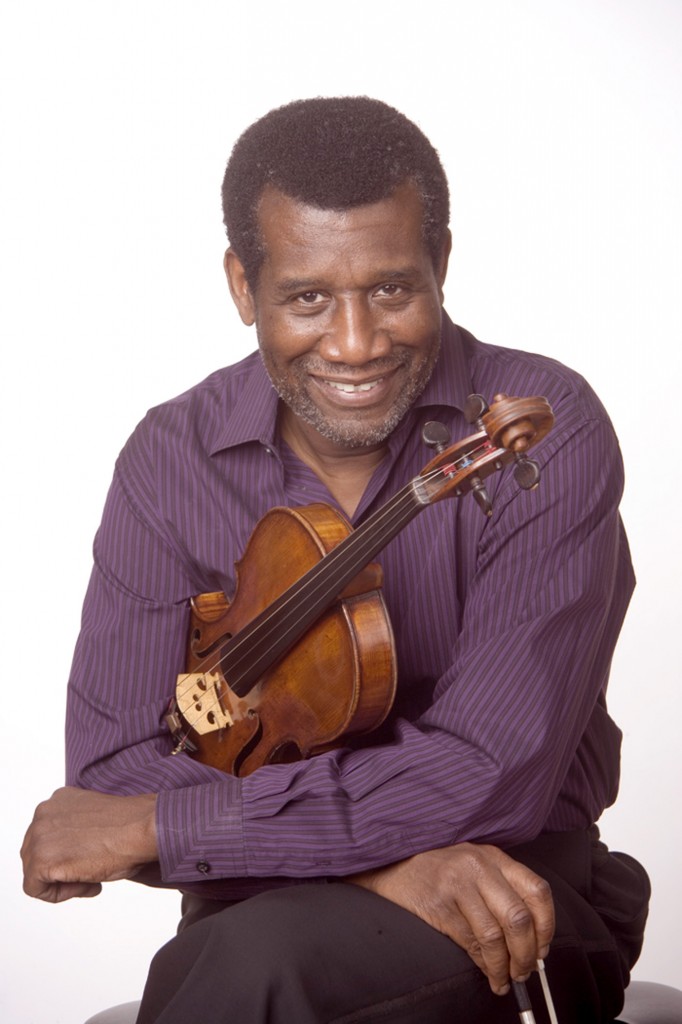Boston Chamber Music Society serves up a lively array of repertoire

Marcus Thompson and the Boston Chamber Music Society performed Sunday night at Sanders Theatre.
Though the audience didn’t take up artistic director Marcus Thompson’s invitation to dance in the aisles, the vivid performances from the Boston Chamber Music Society night at Sanders Theatre Sunday night certainly provided an appropriate soundtrack.
Charles Wuorinen’s delightful Bearbeitungen über das Glogauer Liederbuch set the stage for an adventurous and rhythmically infectious program of works by Ravel, Poulenc, and Alberga.
Wuorinen’s six-movement suite for flute, clarinet, violin, and cello–modern arrangements of instrumental pieces from the 15th-century source Glogauer Liederbuch–is a frolic that captures, to good effect, the feel of the Renaissance-era dances. The originals bear the syncopations and harmonic complexities of Dufay, elements Wuorinen, writing in the early 1960s, easily adapted to suit modern tastes.
Flutist Jennifer Grim, clarinetist Alexander Fiterstein, violinist Harumi Rhodes, and cellist Astrid Schween approached the work with a delicate feel for the rhythmic spark and free-flowing tempos. The third piece of the set contained some tender playing from Rhodes. Here and elsewhere, Grim performed with a breathy but velvety tone on piccolo and flute, which, whether or not her intent, gave the hint of a period instrument.
A particular delight of the evening, Poulenc’s Trio for oboe, bassoon, and piano featured a dynamic and polished performance from Keisuke Wakao (oboe), Adrian Morejon (bassoon), and Randall Hodgkinson (piano).
In the first movement, Wakao and Morejon traded running passages with breathtaking agility in the peppery Presto. Hodgkinson answered with subtle, frolicking touch at the keyboard. The second movement beamed from Wakao’s gorgeous singing tone, which Morejon readily matched. And the trio kept the music bouncing throughout the witty finale.
Eleanor Alberga’s Suite from Dancing with the Shadow, a sextet for winds, strings, piano, and percussion, explored extremes of light and shade in its pointed and glossy style.
Opening the three-movement piece, Fiterstein rendered a bouncy, jazz-inflected line; his clarinet sang, whispered, and cried in its wide range with flexibility. Hodgkinson soon answered at the piano with sprinkling filigree. Both went on to achieved a groove that would have suited a jam session.
The duo blossomed to a brief elegiac trio–Rhodes and Schween joined Hodgkinson–before unfolding into a percolating quintet with Grim and Fiterstein entering the fray, all playing with silvery sound. For the final movement, percussionist Robert Schulz supplied pulsing rhythms on congas, wood blocks, and other assorted idiophones to the polytonal swirl of melody, rendered to a fine point by the strings, winds, and piano.
Vocal works by Ravel and Poulenc brought dynamic performances from baritone Christopher Trakas.
In Ravel’s Chansons madécasses, a setting of three texts by Creole poet Evariste-Désiré de Parny, Trakas’ singing was sensuous and alluring for the erotic and slightly pornographic imagery of the first poem. In the second, the anti-colonial “Aoua!,” he opened with such anger and intensity that he swept his music off his stand. Making a quick recovery, he continued with a hard, forceful tone to match the Schoenbergian density of the flute, cello, and piano accompaniment. Trakas’ voice provided sweet and affecting tone to “Il est doux de se coucher.” The trio of Grim, Schween, and Hodgkinson led the way with aplomb.
Precision was also the hallmark of BCMS’ reading of Poulenc’s jocular and delightfully absurdist Le Bal masqué.
Based on poetry of the surrealist Max Jacob, Poulenc’s cantata for baritone and chamber ensemble contains impish music, popping rhythms, and harmonies that are at times both jarring and cloying.
Trakas’ animated singing suited well the spritely and fun “Malvina.” And his voice swelled for the music’s sappier, melodramatic moments in “La Dame aveugle” (The Blind Lady).
The work’s instrumental interludes featured sharply drawn playing from the ensemble. Rhodes and Hodgkinson exchanged witty dialogue in the Bagatelle. And Rhodes played the leaps and bounds on her violin with mesmerizing control. Trumpeter Andrew Stetson supplied a smooth-edged tone to the music’s gaggle of crossing melodies.
The Boston Chamber Music Society will perform Menotti’s Suite for Two Cellos and Piano, Schostakovich’s Piano Quintet and Schubert’s String Quartet in C major 7:30 p.m. May 12 at Sanders Theatre. bostonchambermusic.org
Posted in Performances